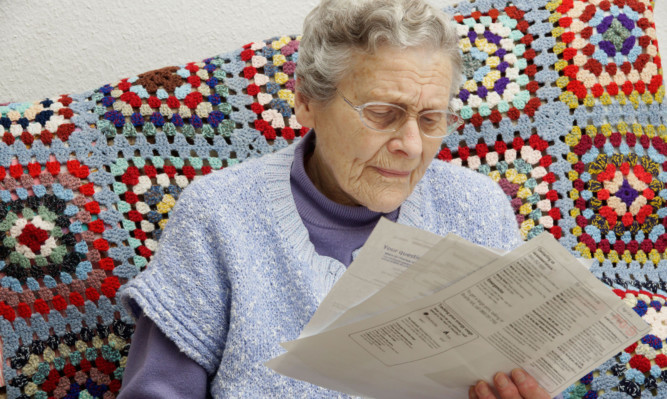
Lives in danger as rising bills plunge pensioners into fuel poverty.
Soaring energy bills are having a devastating impact on pensioners who have seen the value of winter fuel allowance payments plummet by almost a third.
A Sunday Post investigation can reveal average dual fuel bills for retired households have risen from £411 in 2004 to a crippling £1,101 this year.
This equates to a near-170% rise in the cost of heating a home, a staggering hike which has seriously diminished the government’s trumpeted winter fuel allowance payments which work out at £200 for 62-79-year-olds and £300 for those aged 80 plus.
Shamefully, during the same 10-year period, bills have risen by more than four times inflation and fuel poverty has claimed the lives of almost 9,000 pensioners in Scotland alone.
Thousands more are so desperately cold they have moved into one room to save money or are even going to bed when they are not tired.
The winter fuel handout was introduced by Labour in 2003 to help the elderly pay their fuel bills during freezing weather.
It was meant to stop the scandal of the most vulnerable being forced to choose between eating and heating.
But millions of pensioners are struggling to make ends meet because the bills have spiralled so alarmingly while the fuel allowance has remained the same.
Campaigner Norman Kerr, of Energy Action Scotland, insists both Westminster and the Scottish Government must start treating the problem as a top priority.
He said: “If we want to stop these frightening statistics, then we need to treat it as a public health issue and ensure people have warm dry homes that they can afford to heat.
“There are more excess winter deaths in Scotland than road traffic fatalities. We do an awful lot to highlight the importance of safe driving and it’s supported by a big public safety message.
“I think it’s clear we should be doing the same for staying warm in your home.”
Our in-depth investigation probed 10 years’ worth of statistics relating to the heating crisis.
During that period pensioners have seen their dual fuel bills soar by 170%, plunging more than three million into fuel poverty. That’s when households spend at least 10% of their income on heating and lighting.
It all means the value of the winter fuel allowance has technically shrunk by 31%.
Pressure on the elderly has increased further by the basic state pension over the same period increasing by just 42%.
A spokesman for Age Scotland said: “Cold temperatures can be very dangerous for older people’s health. They increase the likelihood and severity of flu, and chest infections and raise blood pressure, which puts people at greater risk of heart attacks and strokes.”
Earlier this week the Scottish Government released statistics revealing fuel poverty deaths were at their second lowest level last winter since 1951.
However, on average since 2002, six people over the age of 65 have died every day during the winter months.
Clare Welton, of Fuel Poverty Action, said: “With four million households across the UK in debt to their energy supplier, one in four mothers making the choice between heating or eating and thousands of deaths from fuel poverty every year whilst the Big Six make billions it is evident that our for-profit energy system is not working.
“The problem is exacerbated by the UK’s draughty, expensive housing stock which is in the hands of landlords who don’t care if their tenants freeze.”
Ironically the UK Government is spending millions on winter fuel payments to ex pats who’ve moved abroad to escape the cold British climate.
Last year alone the overall expenditure was £21 million. Almost £9 million of that went to pensioners living in Spain. Ten years ago just £1 million was spent on foreign allowances.
John Robertson MP, who sits on the Energy and Climate change Committee, believes the Big Six firms should be made to contribute to the winter fuel allowance.
He said: “We need to make sure the most vulnerable are properly cared for. A windfall tax on the energy firms would ensure that’s the case.
“It would be easy to blame the companies, but they will do what companies do to maximise their profits.”
A Scottish Government spokesman said: “It is a scandal that there should be any fuel poverty in a country as energy-rich as Scotland.
“We are doing all we can with the powers we currently have to address this issue and ensure that everyone has a warm, affordable home.”
People worried about winter fuel bills are encouraged to call the Homes Energy Scotland hotline on 0808 808 2282 for free and impartial advice on how to save money.

Enjoy the convenience of having The Sunday Post delivered as a digital ePaper straight to your smartphone, tablet or computer.
Subscribe for only £5.49 a month and enjoy all the benefits of the printed paper as a digital replica.
Subscribe